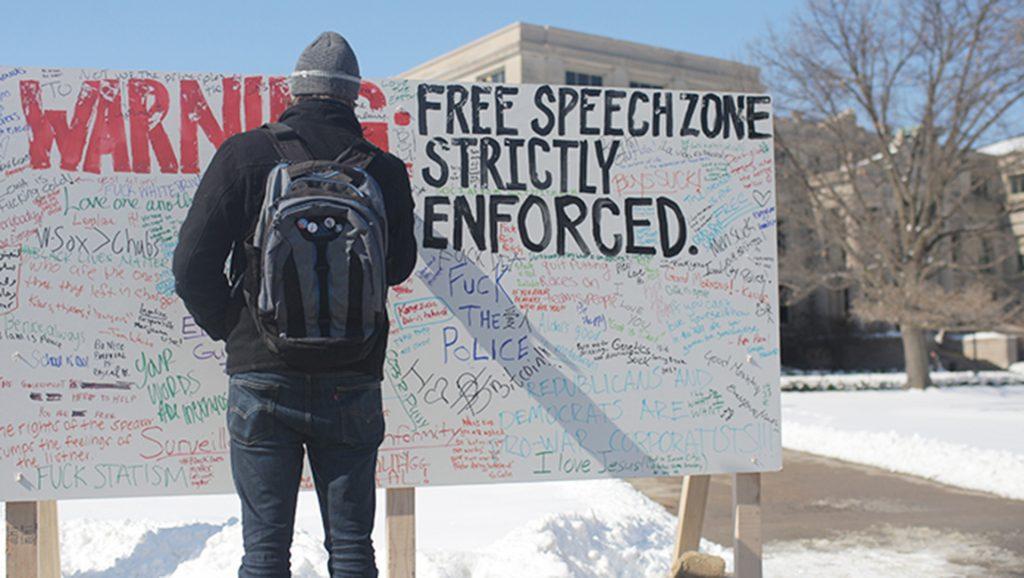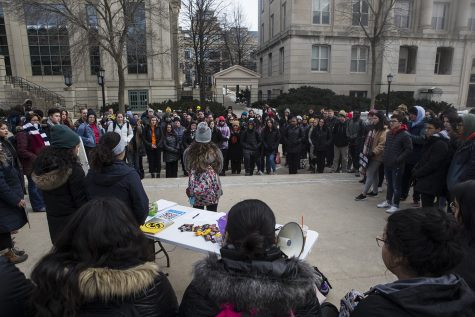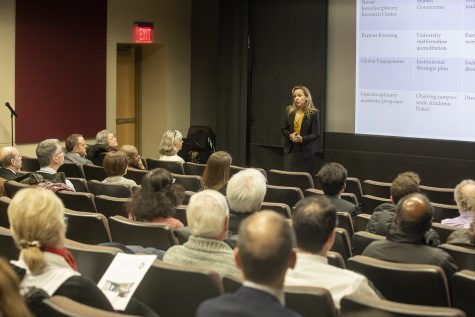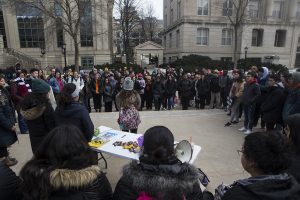Banerjee: Censorship isn’t black or white
Before the word “censorship” is flung around wildly, people should take some time to consider whether or not it even applies. Asking for safety in public circles is not necessarily the same as demanding censored language or activity.
UI senior Spencer Smith writes on a board for the Freedom of Speech protest put on by Young Americans for Liberty group on the Pentacrest on Thursday, Feb. 26, 2015. The student-run group allowed anyone to write whatever they wanted on the board.
March 6, 2019
As Americans, we love our First Amendment rights. The constitutional freedom of speech we enjoy is as integral to our culture as it gets, priding ourselves on our self-appointed free-speech. This is why the boogeyman of censorship feels like such a dangerous threat — it is the tangible, undemocratic enemy to everything we hold important. But, what even is censorship? What counts as censorship? Who is being censored right now, and who is doing the censoring? For such an ever-present danger, there is a large distance between the legalese that defines censorship and the people who believe their speech to be inalienable.
The American Civil Liberties Union defines censorship as “the suppression of words, images, or ideas that are ‘offensive,’ ” which seemingly applies to a whole slew of language. Over time, the U.S. has worked to parse down its definition, trying to reduce the opportunity for misunderstanding. For example, obscenity was decided to be something censorable in Miller v. California (1973).
RELATED: Neal: Will a hashtag make the UI love us?
Censorship protects at-risk speech, including language that may potentially be offensive. In order for speech to be legally censored, it must be directly harmful or leading to direct danger for someone — language that feels simultaneously particular and deeply vague.
College campuses have been in the hot seat when it comes to perceived censorship for a long time, ranging from complaints against silencing potential speakers and trigger warning. But, legal governmental censorship and private “censorship” are not necessarily the same entity either.
When a protest against immigrants called for the building of the wall on the T. Anne Cleary Walkway on Feb.21, people asked for it to be taken down. The existence of a table and posters promoting anti-immigrant behavior like this is actively hostile to students. It is nearly impossible to have a student who has no connections to immigrants, either as an immigrant, as the child of immigrants, or as the friend of someone for whom immigration is an important aspect of their identity.
RELATED: Neal: Women’s History Month: reflecting on a racial truth
There is certainly validity to the threat of censorship in the world, of being unfairly ideologically contained. But, asking people to not mobilize against populations that exist on campus is not the same issue. The difference between people being censored and people using “censorship” as a catch-all to cover requests to stop hateful or charged speech is clear: level of danger.
Asking for something like this protest to be removed is not censorship. People have the right to complain about what they perceive as an attack on them and even ask for its abolition, without it being censorship. The power of individuals on “censoring” the speech of others by asking them to not protest their existence is severely limited, and certainly not worthy of being called censorship. The government shutting down the people’s voice is not the same as students asking other students to stop hating their existence in front of them as they try to walk to class.
RELATED: Shaw: #DoesUIowaLoveMe? Maybe not, but there’s hope for a future where it does
Before anyone cries out censorship, there should be some sort of understanding of what censorship really is and when it is applicable. Using censorship to bemoan the way a hateful protest was asked to be shut down belittles what censorship really is and the way it can actually be a danger in modern society. The workings of a university, which even if public is still governed by its internal set of rules and regulations to a large extent, are not the workings of a country. If people on Twitter call for the dismantling of something they deem offensive, they also aren’t asking for a statewide censor. There certainly are legal protections for speech, even if it is deemed offensive to some, and those are valid protections, but that doesn’t negate other people’s ability to demand equality and safety in their circles.




















